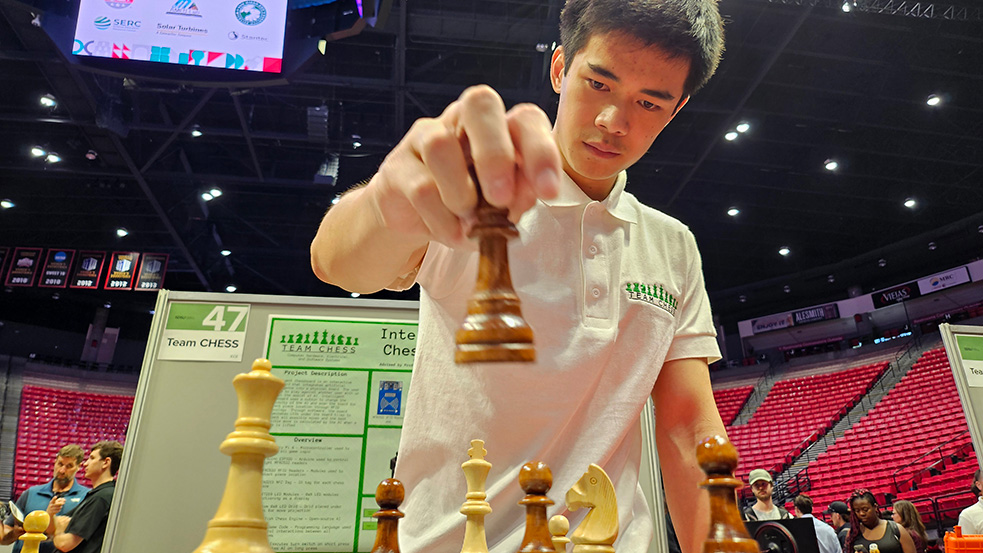Engineering Design Day: Your firsthand look at the future
Graduating seniors prepare for the annual exhibit of capstone projects, from Mars to our own backyard, May 7 at Viejas Arena.

Mechanical engineering senior Sonia Maldonado knew right away which project she wanted for San Diego State University’s Senior Design Day, the College of Engineering’s annual showcase of cool and innovative capstone projects.
Projects are selected from a catalog of ideas submitted by industry, faculty, nonprofits, government and other students, and there’s an unpredictable element to the ultimate team assignments. Maldonado, however, wound up with her top choice: a fishing “launcher” for disabled veterans, sponsored by a nonprofit for injured veterans called QL Plus.
“I selected this project because I am passionate about using my skills to help people,” said Maldonado, a first-gen transfer student from Southwestern College who has lived in San Diego County her entire life. “It sounded interesting to me to build something for those who have served the country.”
Maldonado leads a team of students, “Team FISH” (Fishing Innovations for Service Heroes) — Cristi Salgado (electrical), Fernando Juarez (design), Omar Krichati (manufacturing) and Max Brown (analysis) — in developing a fishing rod designed to be used from a wheelchair. It includes a custom rod holder and push-button casting mechanism with an electric motor and clutch, a trigger and a spring. The mechanism can be adjusted to the strength and dexterity of the user’s hands and fingers.
Showcase of innovation
It's just one of nearly 90 displays at Senior Design Day, 1-4 p.m. Wednesday, May 7, at Viejas Arena. The free event, which drew more than 2,300 visitors and participants in 2024, begins at noon with a private, one-hour “sneak peek” for students from specially invited high schools.
The SDSU students’ projects “reflect the depth of technical knowledge, creativity and collaboration they’ve developed during their time at SDSU,” College of Engineering Dean Eugene Olevsky wrote in an introduction to the Design Day program. “This hands-on experience equips them with the skills and confidence needed to address real-world challenges and thrive in their future engineering careers.”
Scott Shaffar, a lecturer in the mechanical engineering department, said Design Day prepares seniors “to move from being a student to being an engineer in industry or government, or wherever they decide to go to work.”
In just a nine-month period, students learn “how to work with a customer that has a challenge that needs to be met, and how to go from that concept all the way through research, project definition, coming up with design ideas, analyzing those, and then fabrication, assembly and testing.”
What visitors will see on the floor of Viejas Arena, Shaffar said, is “a remarkable generation of engineers that are going to invent the future.”
The projects come from all four departments in the College of Engineering and range from fusion research and space probes to the moon, Venus and Mars, to a stormwater capture, treatment and reuse/irrigation system for an Encinitas city park. Some 500 students comprise the design teams and projects from previous years have gone into production and won national awards.
Among this year's entries:
- Elephant Behavior Monitoring Collar from a team calling itself The Herd, commissioned by the San Diego Zoo Wildlife Alliance. Team lead Zachary Watkins said it is intended both as a way of tracking elephant behavior at the San Diego Zoo Safari Park and in the wild, helping conservationists in Kenya keep elephants “happy and healthy, and not in any sort of danger.” The waterproof, half-circle canvas collar transmits data wirelessly to a remote location and is solar-powered, using a 3D-printed housing to protect the electronics.
- LED Piano from Team Ate, a project to introduce the piano to beginning and intermediate players by using green- and red-flashing LED lights to show which keys to play.
- Mars Ice Cubesat Expedition, a small, cubic and relatively inexpensive, solar-powered spacecraft to map near-surface ice deposits in mid-latitude regions of the Red Planet for possible use in life support and generating hydrogen fuel.
A booklet with all the projects, team members and a list of sponsors, can be viewed online.
Shaffar said examples of projects from previous years include improvements to a Dexcom’s continuous glucose monitor system, and a 3D-printed trash can lid locking device, developed for Ellsworth Air Force Base in South Dakota where high winds were blowing over cans and spreading trash onto runways.
Both projects now have patents.



